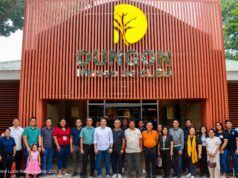MALOLOS CITY—Planting rice is never fun, so a folk song goes, dramatizing the hardship of farmers in raising the staple crop.
Today, local farmers are learning that farming is not only fun, but good business citing increased production and earnings.
This developed as Bulacan farmers slowly shifted from traditional methods to precision farming to adapt to changing climate and improve production.
Arsenio Barcelona explained that precision farming is not only when and how much fertilizer is used. Instead, it starts from the choice of seeds to be planted, then to land preparation, irrigation and crop management.
Each segment of the crop production processes is aided by modern technologies from abroad including use of Japanese invented effective micro-organisms to condition soil, utilization of plastic mulch from Taiwan and drip irrigation system from India and Israel.
“We call it precision farming with the aim of improved production results,” said Barcelona, the president of Harbest Agribusiness Corporation.
He said that today’s farmers must be equipped with knowledge on what seeds to be planted in certain of the year.
At the same time, farmers must also know that condition of the soil in the farmer where the seeds will be planted.
This process requires soil testing to determine current amount of nitrogen, phosphorus and potassium in the soil.
Gloria Carillo, head of the Provincial Agriculture Office (PAO) explained that said nutrients which are essential for plants to grow, are extracted from the soil every harvest and must be replaced if farmland is to remain productive.
To determine the amount of said nutrients, soil sample are usually submitted to the PAO’s soil testing laboratory in this city.
Carillo said that it is a simple process that allows farmers to maximize production in their farmland.
Melencio Domingo, head of the Malolos City Agriculture and Fisheries Council (MCAFC) said soil testing is being practiced by few farmers until a few years ago.
”Through trainings and seminars, we learned its importance and now, many are looking forward to it to maximize production,” Domingo said.
The same was echoed by Reynaldo Victoria, a farmer from Barangay Bubulong Malaki in San Ildefonso town, and vice chair of the San Ildefonso Vegetable and Palay Growers Multi-purpose Cooperative.
He said increasing demands for vegetables in Metro Manila led local farmers to explore new technologies introduced to them in trainings.
”Many of us are now into precision farming because we found farming is fun,” he said in vernacular.
Victoria’s claim that farming is fun is not unfounded as San Ildefonso town is considered as the vegetable basket of the province and is the source of at least 60 percent of the daily vegetable requirements of the metropolis.




